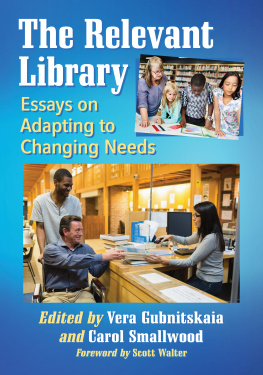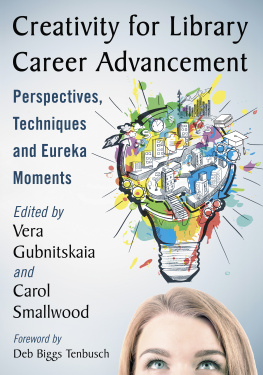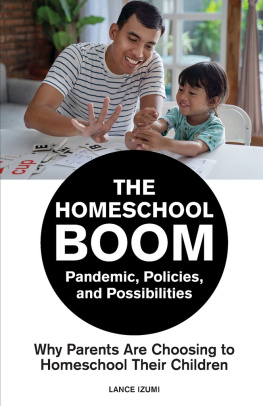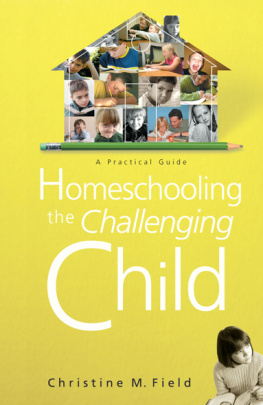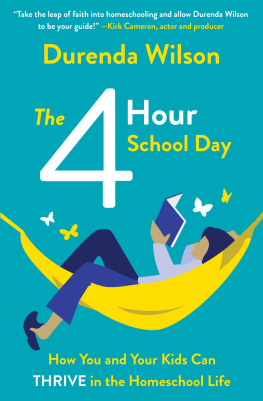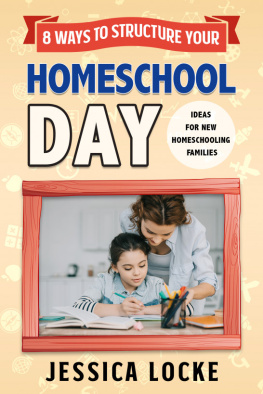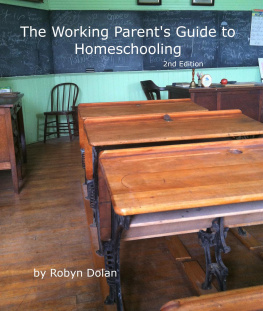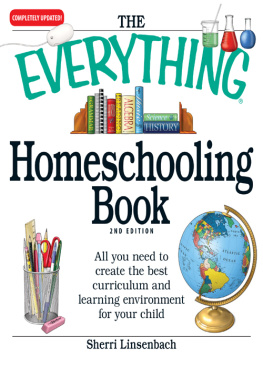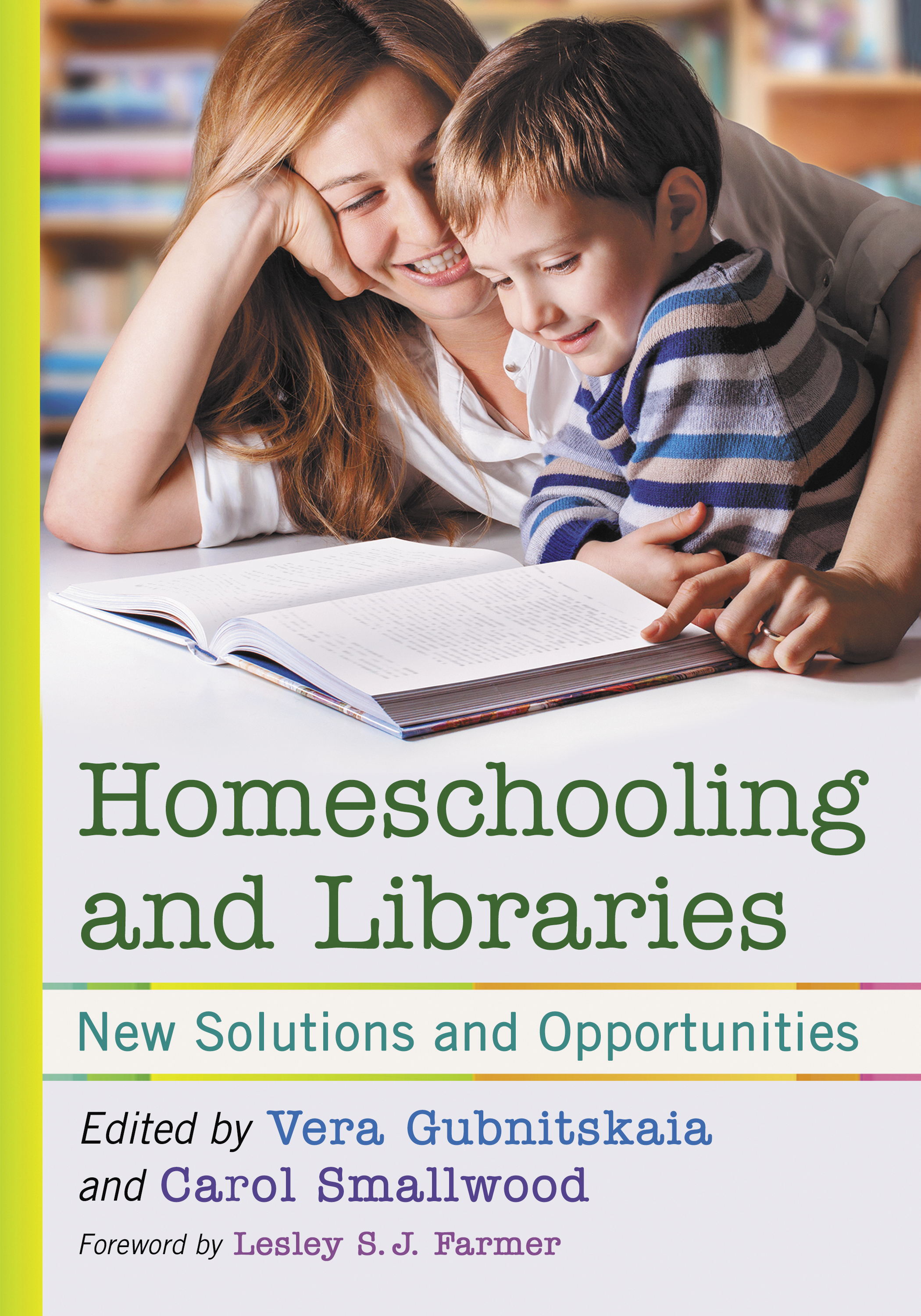Homeschooling and Libraries
New Solutions and Opportunities
Edited by Vera Gubnitskaia and Carol Smallwood
Foreword by Lesley S.J. Farmer

McFarland & Company, Inc., Publishers
Je f ferson, North Carolina
Recent McFarland Works of Interest
Creativity for Library Career Advancement ,edited by Vera Gubnitskaia and Carol Smallwood (2019)
Social Justice and Activism in Libraries, edited by Su Epstein, Carol Smallwood and Vera Gubnitskaia (2019)
The Relevant Library, edited by Vera Gubnitskaia and Carol Smallwood (2018)
Genealogy and the Librarian, edited by Carol Smallwood and Vera Gubnitskaia (2018)
Library Partnerships with Writers and Poets , edited by Carol Smallwood and Vera Gubnitskaia (2017)
Continuing Education for Librarians , edited by Carol Smallwood, Kerol Harrod and Vera Gubnitskaia (2013)
Marketing Your Library, edited by Carol Smallwood, Vera Gubnitskaia and Kerol Harrod (2012 )
ISBN (print) 978-1-4766-7490-2
ISBN (ebook) 978-1-4766-3923-9
Library of Congress and British Library cataloguing data are available
Library of Congress Control Number 2020008487
2020 Vera Gubnitskaia and Carol Smallwood. All rights reserved
No part of this book may be reproduced or transmitted in any form or by any means, electronic or mechanical, including photocopying or recording, or by any information storage and retrieval system,without permission in writing from the publisher.
Front cover photograph by George Muresan (Shutterstock)
Printed in the United States of America
McFarland & Company, Inc., Publishers
Box 611, Jefferson, North Carolina 28640
www.mcfarlandpub.com
Table of Contents
Foreword
Lesley S.J. Farmer
As a YA librarian in suburban Philadelphia more than thirty years ago, I remember teaching homeschooled youth weekly, collaborating with their teachers and families. Homeschooling is increasingly popular now for a variety of reasons: personal, ideological, physical, and educational. Similarly, the need for librarians to help homeschool families become information and media literate is more important than ever. Thus, this volume fills an important and timely gap. More specifically, this edited collection includes various librarians voices, which underscores the diverse needs and learning experience of homeschooled youth.
As each homeschool child has a unique background, needs assessments are vital for effective library service. Part I explains why families choose to homeschool and lists several learning opportunities for them, mentioning the librarys potential role and relevant resources. The second essay in this part focuses on African American needs for culturally relevant library practices. The third essay uses a system-wide approach to assessing and meeting the library needs of homeschool families.
Homeschooled youth often experience special circumstances, which inform library services. Part II addresses the unique needs of atypical populations. The essay by Sarah M. Sieg and the one by Angiah Davis and Cordelia Riley focus on children with disabilities and learning differences, listing targeted services and relevant resources. Barbara J. Hamptons essay addresses the needs of gifted and talented youth, including support for their families.
Part III focuses on specific library programs; case studies provide a rich lens for analysis. The essay by Sarah Polace, Amy Dreger and Meghan Villhauer, and the one by Leah Flippin, include several types of program ideas, and suggest ways to plan and publicize these programs, including modifications to address the needs of this population; and Holly S. Heberts essay highlights the social aspects of these programs. The essays by Leslie Paulovich and Casey OLeary and Ruth Szpunar both provide case studies of specific initiatives for homeschoolers: a homeschool hub and programs to revitalize the homeschool community.
While public libraries tend to serve as the main source for information literacy instruction, other informal educational settings also teach homeschooled youth important information literacy concepts. Part IV showcases other library settings where homeschool families are supported: academic libraries for parenting advice, services and expanded collections; school libraries for socialization; and special resources in various types of libraries.
Part V focuses on one important aspect of library services for homeschooled youth: finding resources. Essays in this part describe general strategies for best practices as well as funding sources, strategies for financing, and examples of grant-funded initiatives.
Part VI recognizes that homeschooled youth might become librarians themselves: from a personal narrative to a systematic outreach initiative to recruit librarians within groups of homeschooled learners. Maryann Moris essay details in-service training of a youth services librarian to gain competency in direct instruction for homeschoolers.
Part VII presents points of view of family and library trustee stakeholders, by collecting and analyzing data from surveys, direct observation, and interaction.
Part VIII, titled Infinite Possibilities, offers three promising library practices for homeschooled youth: free play, role-playing games, and keeping current on homeschooling issues. Details include case studies of planning, implementation, and modifications.
In sum, librarians need to know their communities and reach out explicitly to homeschooling families. As with other populations, librarians need to assess the needs of homeschooling families and identify ways to provide physical and intellectual access to library resources. Such librarian efforts need to build relationships and address the needs of the entire family. Indeed, libraries, especially public libraries, serve as a social safety net for homeschooling families.
To this end, this book offers varied proven practical insights into providing relevant resources and services to homeschooling families. Not only should librarians consider this population part of the community that they serve, but they should realize the unique support role they can play in educating, informing, and inspiring homeschooling families who have unique needs that are often overlooked by the rest of their communities.
Lesley S.J. Farmer, a professor at California State University (CSU) Long Beach, coordinates the librarianship program and manages CSUs ICT Literacy Project. She chairs CSLAs Committee on Standards Integration and the Research TF. Her research interests include digital citizenship, information literacy, and data analysis. She is the author of Managing the Successful School Library (ALA, 2017).
Preface
Parent-led homeschooling is the choice of many families in the United States and other countries. Homeschooling and Libraries is a collection of 27 original essays from U.S. practicing academic, public, school, and special librarians, LIS faculty, library administrators, and board members. The contributors provide creative, practical, how-to essays and case studies depicting a variety of specific programs, projects, aspects, and angles of the library role and impact on homeschooling process, families, and students, within the library walls and beyond. Ideas that can serve as a basis, a foundation, to incorporate into an MLIS course, a human resources or an organizational plan, as well as a kick-start to personal career goals planning were also included.


